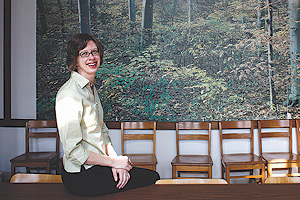Jessica Cattelino, Assistant Professor in Anthropology and the College
By William Harmsw-harms@uchicago.edu
News Office
 Photo by Beth Rooney Jessica Cattelino | |
“What I like about working with College students is their fearlessness. They are eager to read and learn,” said Jessica Cattelino, Assistant Professor in Anthropology and the College.
Giving students challenges they can meet is one way Cattelino believes she can be an effective teacher.
“While teaching in the Social Sciences Core, I found early on that if I tell students I’m giving them a particularly difficult text to read, they rise to the challenge. It’s very much a University of Chicago reaction,” she said.
“I demand close reading in seminars, and I target classroom discussion to issues that have arisen in students’ response papers. Reading a pile of response papers before each class increases my prep time, but the payoff in classroom discussion is noticeable.”
Cattelino also has been working with students in the Gender Studies program this year and has found the experience particularly satisfying, she said.
“This year, thanks to a course development grant from Gender Studies, I taught a new class at the intersection of gender and economic anthropology, ‘Economies of Sex and Gender.’ We look at the ways in which gender, sex and the economy are linked in theory and practice, examining issues such as the household economy, gender and international development, prostitution and work.
“It’s an interdisciplinary course, and I’ve found that the students have a real hunger for learning, for rigorous study, all while sustaining a deep engagement with how the topics under examination relate to important public issues of our day,” she said.
Besides the course in the Gender Studies program, Cattelino teaches a class in the Core called “Power, Identity and Resistance,” in which students read the works of Adam Smith, Karl Marx, Émile Durkheim and Marcel Mauss to examine the social meanings and functions of economic life.
She also has co-taught a class on Native North America with veteran anthropologist Raymond Fogelson, who also taught this class as a young faculty member with Fred Eggan, one of the famed members of the Anthropology Department.
In addition to her courses, Cattelino also advises a number of students on their A.B. theses, which often involve ethnographic fieldwork.
“One of the papers I’ve advised is for a student who studied the everyday meanings of the U.S.-Mexico border for indigenous Tohono O’odham people, whose territory it bisects.
“The student found that narratives about the border were important for the O’odham people, who have come to understand themselves and the meanings of colonialism through those narratives.”
She also has advised students working on a variety of research projects, including studies of Chicago street musicians, the disposal of nuclear waste on American Indian reservations, Irish-American material culture in Chicago, the Burning Man festival and indigenous-operated museums in Mexico.
![[Chronicle]](/images/sidebar_header_oct06.gif)